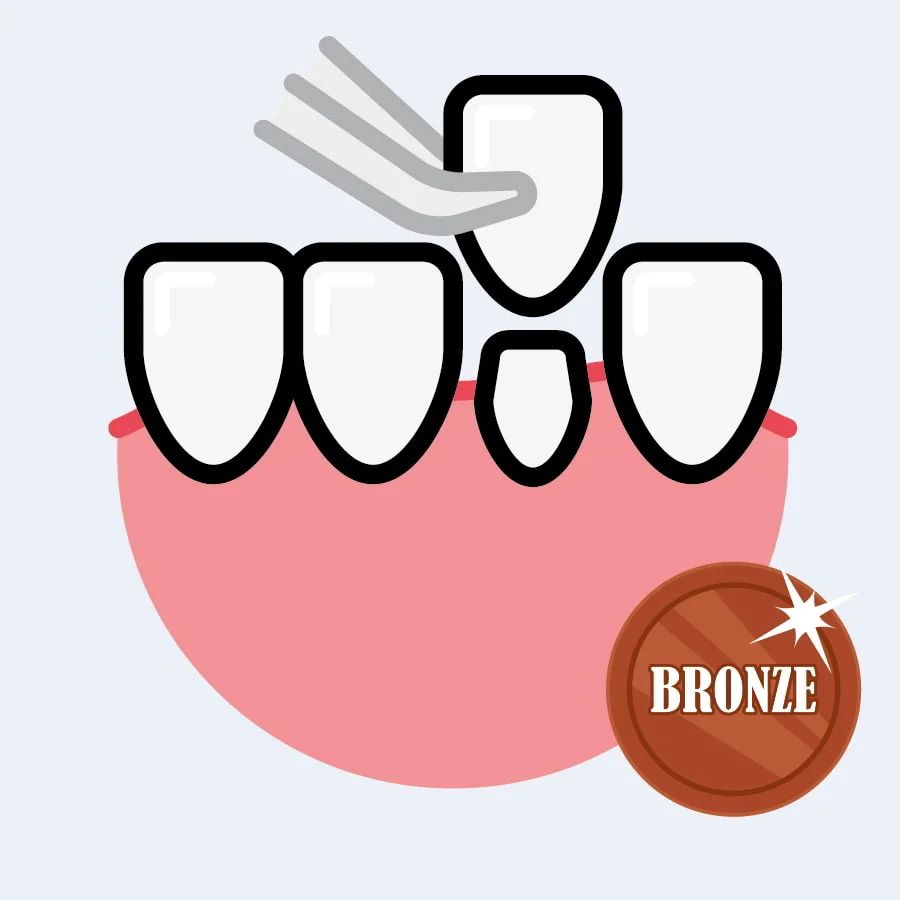Dental Veneers
For a Radiant Smile










Book Your FREE Consultation
Limited Availability
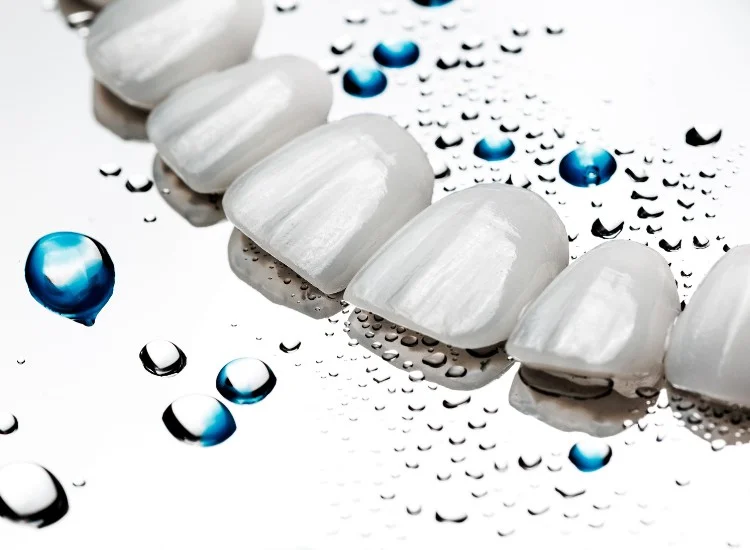
What are Dental Veneers
Dental veneers are a popular cosmetic dental treatment designed to improve your smile. Veneers are thin shells of pressed porcelain that fit over the surface of the teeth. An alternate treatment to porcelain veneers are composite veneers – composite veneers are less invasive, but also have a shorter-lifespan compared to porcelain veneers. Your dentist can advise you on which treatment will work best in your case to accomplish the smile results you want.
Dental veneer cost varies depending on the material used and the number of teeth treated, but our treatments range between £500 to £800 per tooth treated. You can save money on multiple teeth with our smile makeover package offers here!
What Dental Problems Can Veneers Fix?
Dental veneers are versatile and can solve a range of problems from covering a cracked tooth to creating an overall cosmetic smile enhancement. Veneers can fix:
Discoloured Teeth: Veneers can change the appearance of severely discoloured teeth in situations where cleaning won’t remove deeply imbedded stains. For stubborn stains that whitening treatments can’t tackle, veneers for discoloured teeth offer a permanent solution, restoring your beautiful white smile!
Chipped teeth: Dentists can also use veneers for chipped teeth to restore, not just the visual appearance of chipped and cracked teeth, but also the chewing function and biting surface.
Teeth gaps: Veneers can make your teeth appear straighter by altering the size and shape of your teeth to close gaps and create a straighter smile!
Unevenly shaped teeth: Veneers can reshape your teeth to create a more symmetrical and smilebalanced looking smile.
What Are The Differences Between The Types Of Veneers?
At Synergy, we offer a range of different veneer options to suit your smile goals and your budget. We offer both composite veneers and porcelain veneers, and have a range of different levels of porcelain quality including E-max and Zirconia veneers to give you the most natural finish possible without compromising on strength.
Composite veneers: A more affordable veneers option, composite veneers use our nano-hybrid bonding material instead of porcelain. Composite veneers are a form of composite bonding treatment. The benefits of composite veneers are that they can usually be completed in a single visit. They require very little preparation of the teeth and can be completed with no drilling, no needles, and no pain! Composite veneers don’t last as long as porcelain, and are not as strong, but cost less. You can learn more about composite veneers on our composite bonding page here.
Porcelain veneers: These long-lasting veneers are known for their exceptional durability, natural appearance. Our bronze quality veneers are low-maintenance and long lasting, but are only suitable for front teeth as they are not as strong as our higher quality porcelain. This makes them a great option for people seeking a new smile on a budget. Our silver quality veneers are thicker and stronger, making them suitable for covering more teeth, and are available in a wider shade range. Finally our gold quality porcelain offers an even wider range of shades for a more natural appearance. It is also extremely strong and highly durable for anyone looking for a stain-resistant veneers option.
No prep veneers: Also known as E-max veneers, these are ultra-thin shells of compressed porcelain, designed to fit over your teeth with minimal preparation. They are made from the highest quality porcelain, backed with a compressed porcelain substructure to add strength without needing to compromise on appearances. The unique creation process of E-max veneers creates a range of shade variations within the porcelain – just like the shade variations within your natural teeth! This makes your veneers indistinguishable from your teeth, letting them blend seamlessly with your natural smile. These are the absolute best veneers available!
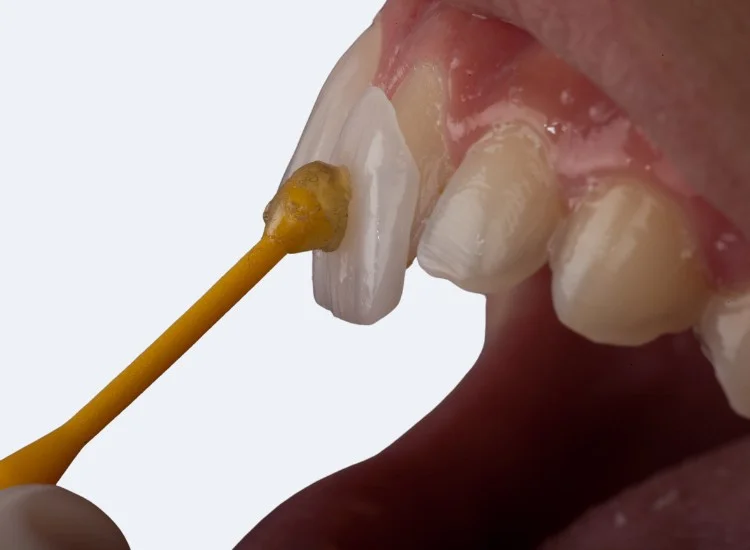
Why Choose Synergy Dental Clinics For Your Veneers?
Our clinic utilises modern veneer technology and advanced dental veneers techniques to deliver natural-looking veneers that blend seamlessly with your existing teeth. Our customised veneer solutions are designed to fit your mouth perfectly, improving your comfort and your aesthetic results. Our dental veneer specialists are dedicated to providing you with professional veneer application and exceptional results.
We offer multiple different dental veneer options and specialise in custom-made veneers as well as personalised veneer treatment plans to achieve a natural-looking, long-lasting result.

How Are Dental Veneers Fitted?
The Veneer Treatment Process in 4 Steps!
The veneer treatment process is typically straightforward and usually only requires between one and three appointments.
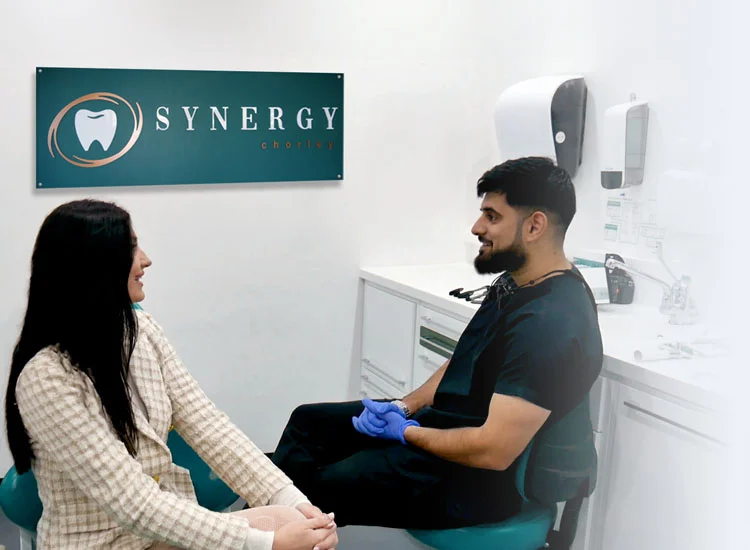
Step 1 – Veneer consultation
During your consultation, we will discuss your cosmetic goals and determine what treatment is right for you based on your current teeth, what you hope to accomplish, and the dental veneers cost.
We also offer finance options to help you spread the cost.
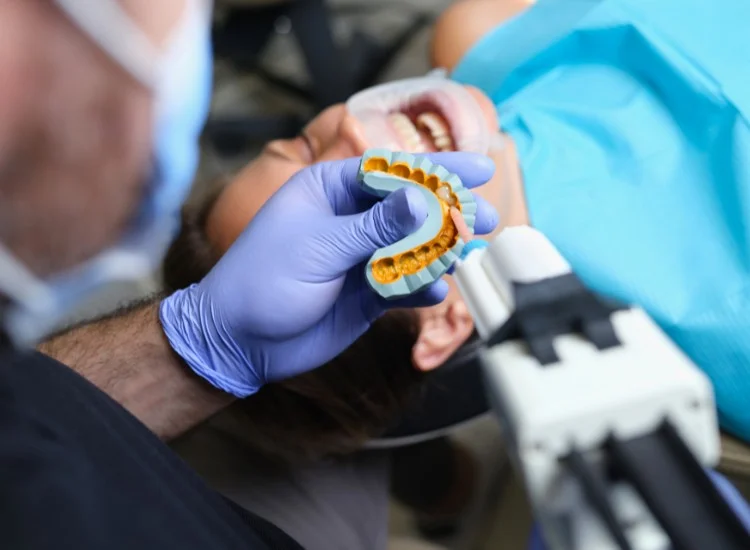
Step 2 – Veneer preparation
In some cases, minimal veneer preparation might be required to ensure a proper fit for the veneers. Our dentists utilise advanced techniques like digital veneer planning to minimise the amount of enamel removed – ensuring your natural teeth underneath your veneers remain healthy. We typically only remove between 0.3mm to 1mm of enamel.
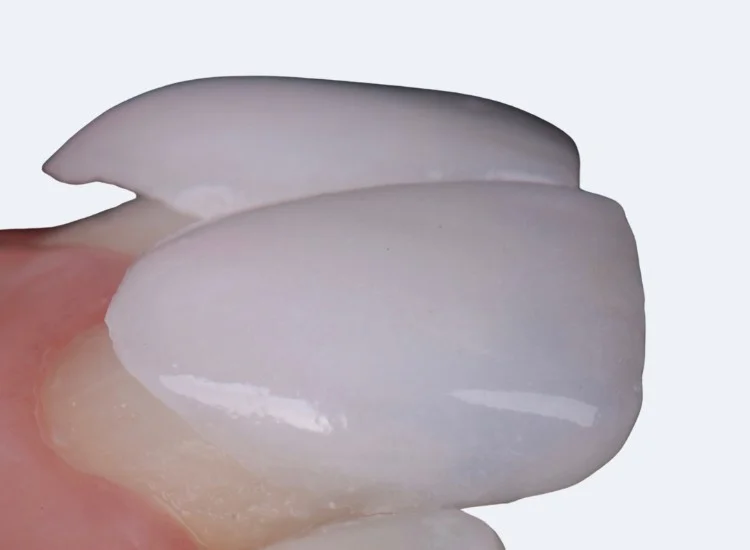
Step 3 – Temporary veneers
While your permanent veneers are being crafted in a dental lab, temporary veneers will be placed so you can go home with a smile.
It typically only takes a few weeks for the lab to create your new smile. During this time, we’ll work with you on the size, shape, and shade of your new teeth to make sure your final smile is exactly what you want.
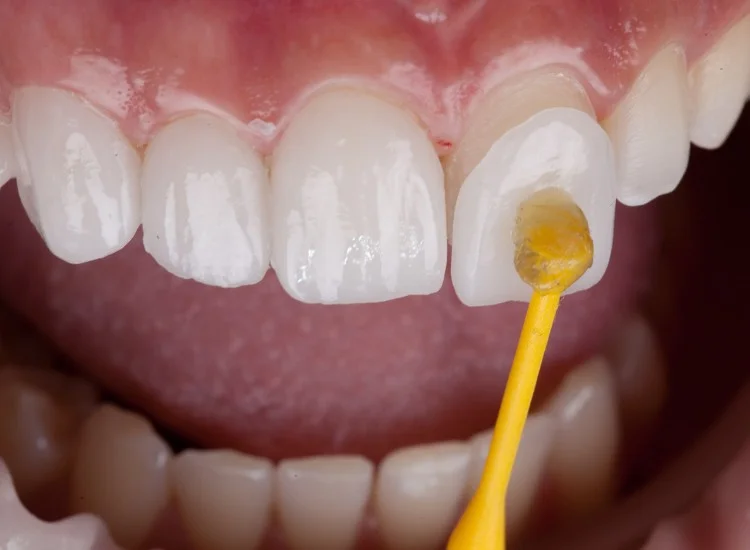
Step 4 – Veneer fitting procedure
Once your permanent veneers are ready, we will carefully bond them to your teeth using a veneer bonding technique.
This painless procedure ensures a strong, natural-looking result. By following the advice of your dentist and attending regular checkups, your veneers should last you for years to come!
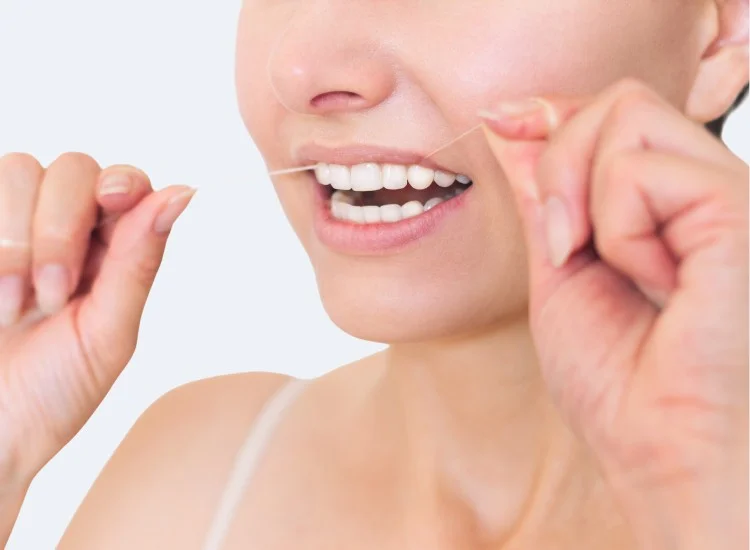
Veneer maintenance tips
Some porcelain veneers benefits include boosted confidence and an improved smile! In order to keep your new smile shining, it’s essential to follow the veneer maintenance tips given by your dentist.
Whilst your dentist will give you specific guidance on how to care for your veneers, some general advice includes: avoid hard foods that may chip your veneers, and avoid smoking and drinks like coffee that may stain your new veneers.
It’s important to remember that your natural teeth are still underneath your veneers, and they need to be protected from tooth decay, therefore you need to clean and floss your veneers just as diligently as you would with your natural teeth.
Patients Reviews
We understand that dental veneers cost more in the UK compared to prices offered abroad. It’s important to remember that other countries are not held to the same dentistry standards as the UK. What is advertised abroad as dental veneers may in fact be crowns, a more aggressive treatment. When considering veneer treatment, make sure to weigh up the costs in the UK compared to the risks of going abroad.
Check our pricing table below to find out how the costs compare or check out our package deals here to see how much you could save on multiple teeth.
| Porcelain Quality | Description | Price per Tooth |
|---|---|---|
| Bronze | Made from porcelain. Not suitable for back teeth due to strength. | £500 |
| Silver | Made from mid-quality porcelain. Multiple shades available. Thick contour makes them stronger. | £600 |
| Gold | Made from high quality porcelain. Multiple shades available. Matched to your natural teeth during a complimentary shade appointment. Extremely strong and highly durable. | £700 |
| E-Max | Our highest quality porcelain. Minimal preparation required. Superior finish. Shade variation makes them indistinguishable from your natural smile. Matched to your natural teeth in a complimentary shade appointment. Strong and durable. | £800 |
| Composite Veneer (composite bonding) | No preparation required. Can be completed in a single visit. Blends to your natural teeth seamlessly. | £350 |
Dental Veneers FAQs:
With proper care veneers can easily last for 10-15 years, sometimes even longer, without any problems!
Porcelain veneers offer a permanent aesthetic dental solution that can be used to treat a range of cosmetic problems. They improve your overall smile and boost your confidence. They’re extremely durable and long-lasting, meaning you can enjoy a beautiful smile for years to come!
Composite veneers are a less invasive treatment compared to porcelain veneers, and are fully reversible. They’re also cheaper and faster – usually composite veneers can be completed in just one appointment! Composite veneers are strong (but are not as strong as porcelain) and can last for up to 5 years.
Both porcelain veneers and composite veneers cannot be whitened by bleaching your teeth. Porcelain veneers are irreversible, and require for the teeth to be carefully shaved. Composite veneers are not as strong and long lasting as porcelain.
Whilst veneers offer a permanent solution to cosmetic issues, they also help to protect your teeth underneath by covering them up and protecting them from further damage.
Your teeth under veneers should stay healthy, provided that you follow your dentist’s cleaning advice. Tooth decay can still occur underneath your veneers, so it’s important to make sure you’re following the veneers maintenance tips given by your dentist and keeping your teeth clean.
Because porcelain veneers require a thin layer of enamel to be removed, it’s impossible to go back to your natural teeth. There is no going back from porcelain veneers, so make sure you are completely sure that you are happy to go ahead with treatment. Ask your dentist about anything you’re unsure of.
Having your veneers fitted should not be a painful process, though you may feel a little discomfort during the preparation of your teeth. If you’re worried about pain or discomfort, talk to your dentist before the procedure. If you suffer from dental anxiety, many of our dentists offer IV sedation, which you can learn more about here.
After your veneers are fitted, your teeth might feel a little bit strange whilst you get used to the new shape and size of your teeth. If you experience any pain after treatment, call your dentist straight away.
Porcelain veneers are strong and highly stain-resistant, and do not get discoloured easily. Just like your normal teeth, they can become stained by drinks like wine, coffee, and cola, as well as smoking. It’s important to visit your dentist for regular cleanings to maintain your veneers. Composite veneers are not as strong as porcelain veneers and can become discoloured more easily. Avoid foods, drinks, and activities that may stain your veneers. Protect your veneers by using a straw for drinks. Whitening treatments do not work on veneers, as whitening works by bleaching the enamel. With veneers, your enamel is covered, so there is nothing for the whitening to bleach. Whitening will still work on your natural teeth and can be used to make your natural teeth match the shade of your veneers. You can learn more about whitening here.
Crowns are designed to repair a broken or cracked tooth that has been damaged due to injury or tooth decay. Whilst crowns can be used for cosmetic purposes, they are primarily designed to reduce pain and prevent further damage to the tooth. They’re a more aggressive treatment compared to veneers and require more extensive shaving of the teeth. You can learn about crowns here.
Veneers, on the other hand, require less extensive treatment and are primarily used for aesthetic purposes, though they may also be used to repair teeth with minor damage. If you’re unsure what treatment you need, our dentists are always happy to help.
Veneers at Synergy cost between £500 and £800 per tooth, however, we also offer seasonal package deals on multiple teeth, and have finance options available to suit every wallet. Find out how you can spread the cost of veneers here.

Apply for Dental Finance!
Using our finance calculator you can approximate your total cost for dental work and choose to repay from multiple options.

